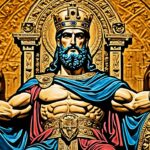Welcome to our in-depth exploration of the biblical figure King Herod Agrippa I. In this article, we will delve into the historical context, life, rule, and legacy of King Herod Agrippa I as portrayed in the Bible. Understanding King Herod Agrippa I is essential for gaining a deeper understanding of the events and narratives in the New Testament. Let’s begin!
Key Takeaways:
- King Herod Agrippa I was a prominent ruler during New Testament times.
- He belonged to the Herod dynasty, a ruling family mentioned in the Bible.
- Herod Agrippa I played a crucial role in the persecution of the early Christian church.
- His death serves as a reminder of the consequences of fighting against God.
- Understanding the story of King Herod Agrippa I provides insights into the historical and biblical context of the New Testament.
The Herod Dynasty in the Bible
In the Bible, several rulers from the Herod dynasty are mentioned. Notable among them are Herod the Great, Herod Antipas, and Herod Agrippa I. Each played a distinct role in the biblical narrative and had a significant impact on the events surrounding Jesus and the early Christian church.
Herod the Great
Herod the Great was a prominent figure during Jesus’ birth. He held the title of “king of the Jews” and is famously known for his role in the attempt to kill the infant Jesus. Herod the Great’s reign was marked by his notable architectural projects, including the construction of the impressive Herodium and the expansion of the Second Temple in Jerusalem.
Herod Antipas
Herod Antipas, another member of the Herod dynasty, ruled during the ministries of John the Baptist and Jesus. He is famously known for executing John the Baptist at the request of his stepdaughter, Salome, after she danced for him. Herod Antipas also had a role in the trial of Jesus, as he sent Jesus back to Pontius Pilate after questioning Him.
Herod Agrippa I
The focus of this article is Herod Agrippa I, who was a different ruler from the Herod dynasty. He is known for persecuting the apostles and playing a crucial role in the early Christian church. The book of Acts describes how Herod Agrippa I arrested and executed the apostle James, the brother of John. Furthermore, he intended to do the same to Peter but was unsuccessful as Peter was miraculously rescued from prison.
This image depicts an artist’s representation of the Herod dynasty, showcasing the three rulers mentioned in this section. It provides a visual representation of the historical figures who shaped the biblical narrative during their reigns.
The Life and Rule of Herod Agrippa I
Herod Agrippa I, the grandson of Herod the Great and the nephew of Herod Antipas, played a significant role in biblical texts and the history of Judea. He spent time in Rome, where he forged friendships with prominent figures such as Emperor Tiberius, as well as future emperors Caligula and Claudius.
With the support of these influential individuals, Agrippa was appointed as a client king of Judea by the Romans. His primary responsibility was to maintain peace in the region and ensure loyalty to the Roman Empire. However, his rule had profound implications for the early Christian church, as described in the book of Acts.
Agrippa’s biography reveals a complex character who held both political and religious power. While his relationship with the Romans secured his position as king, it also meant siding with the ruling power against the growing influence of the early Christians.
Agrippa’s Persecution of the Early Christian Church
The biblical texts, particularly the book of Acts, depict King Herod Agrippa I as a key figure in the persecution of the early Christian church. Fearing the spread and influence of this new faith, Agrippa began targeting and arresting members of the church.
“He (Agrippa) had James, the brother of John, put to death with the sword.” – Acts 12:2
Agrippa’s actions were met with approval by the Jewish population, which in turn motivated him to continue his persecution. He then proceeded to arrest the apostle Peter, intending to execute him as well.
However, the story takes an unexpected turn. Despite being held in a heavily guarded prison, Peter was miraculously freed by an angel. This event showcases the struggle between Agrippa’s power and the divine intervention protecting the early Christian movement.
The Legacy of King Herod Agrippa I
King Herod Agrippa I left a lasting impact on biblical history and the development of early Christianity. His rule and persecution of the church serve as a reminder of the challenges faced by the early followers of Christ.
Agrippa’s biography provides valuable insights into the political and religious dynamics of the time. By understanding the life and rule of King Herod Agrippa I, we gain a deeper appreciation for the biblical context in which the early Christian church emerged and thrived.

Herod Agrippa I and the Persecution of the Church
Acts 12 recounts the troubling times when King Herod Agrippa I mercilessly persecuted the early Christian church. With a relentless pursuit of maintaining peace and appeasing the Jewish population, Agrippa took drastic measures against the followers of Jesus Christ.
Amidst this persecution, one of the key events involved the arrest and execution of James, the brother of John, who was a prominent figure in the church. Witnessing the satisfaction this act brought to the Jewish population, Agrippa decided to further intensify his actions.
His next target was the apostle Peter, whom he arrested and imprisoned. However, much to Agrippa’s astonishment, Peter miraculously escaped from prison with divine intervention. This escape added to the growing tension between Agrippa and the followers of Christ, further fueling the conflict.
“The persecution under Herod Agrippa I was a trying time for the early Christian church. It tested the faith and resilience of the believers, but it also served as a catalyst for their unwavering commitment to their beliefs.”
– Early Church Historian
The persecution of the church by Herod Agrippa I highlights the challenges faced by early Christians as they sought to spread their message and establish their faith. Despite the hardships, the followers of Jesus remained steadfast, with the events during Agrippa’s reign serving as a testament to their dedication and the enduring power of their beliefs.

Key Points:
- Herod Agrippa I targeted the early Christian church in his pursuit of appeasing the Jewish population and maintaining peace.
- James, the brother of John, was executed by Agrippa, which pleased the Jewish population.
- Peter, another prominent member of the church, was arrested by Agrippa but miraculously escaped from prison.
Despite Agrippa’s efforts, the persecution of the church only served to strengthen the resolve and commitment of the early Christians. The events of this era played a crucial role in shaping the narrative of the early Christian church and its enduring legacy.
The Death of Herod Agrippa I
Herod Agrippa I, a prominent figure in biblical history, met his unfortunate demise in the city of Caesarea. The circumstances surrounding his death are both intriguing and significant in understanding the religious dynamics of the time.
Herod Agrippa I had been experiencing tensions with the people of Tyre and Sidon, who sought an audience with him to request peace. During a public address, the crowd began to proclaim that his voice was divine, equating him to a god rather than a mortal man.
“His voice sounds like that of a god, not a man!”
However, instead of rejecting such adulation and acknowledging the power and authority of God, Herod Agrippa I failed to give praise to the Almighty. Consequently, as a divine consequence, an angel of the Lord struck him down, resulting in his untimely death.
The cause of his demise, as recorded by the historian Josephus, was a severe and agonizing stomach pain accompanied by a rapid infestation of worms. This painful affliction inflicted upon him was attributed to his failure to attribute glory to God. It serves as a reminder of the consequences that can befall those who oppose the divine will.

This image depicts the event of Herod Agrippa I’s death, a turning point in biblical history marked by divine intervention. It serves as a visual representation of the significance of this moment.
Impact and Legacy of Herod Agrippa I
The death of Herod Agrippa I serves as a powerful reminder of the consequences that can arise from opposing God. Despite his authority and power, Herod met a tragic end, experiencing a painful demise. However, even in the face of his downfall, the impact of his reign and the persecution he inflicted upon the early Christian church continued to reverberate throughout history.
“For we will surely die and become like water spilled on the ground, which cannot be gathered up again. Yet God does not take away a life; but He devises means, so that His banished ones are not expelled from Him.” – 2 Samuel 14:14
Herod Agrippa I’s rule marked a significant chapter in the biblical narrative, influencing the events described in the New Testament. His persecution of the early Christian church, documented in the book of Acts, created a climate of hardship and adversity for the believers at that time, forcing them to spread the word of God under immense pressure and opposition.
The impact and legacy of Herod Agrippa I extend beyond his own life. Through his actions, he inadvertently played a role in shaping the early Christian movement, inspiring perseverance and dedication among believers who faced persecution. This period of turmoil ultimately contributed to the steadfastness and growth of the early church, highlighting the resilience of those who remained faithful to the teachings of Jesus Christ.
Herod Agrippa I’s legacy underscores the timeless message that no earthly power can silence the truth and the proclamation of God’s word. The martyrdom of early Christian leaders, such as James, only served to strengthen the resolve of the believers, solidifying their commitment to spreading the gospel message.

| Herod Agrippa I’s Impact and Legacy | Description |
|---|---|
| Persecution of the Early Christian Church | Herod Agrippa I’s persecution of the early Christian church in the New Testament created a challenging environment that tested the faith and resilience of believers. |
| Strengthening of the Early Christian Movement | The persecution faced by early Christians under Herod Agrippa I’s rule served to strengthen and solidify their dedication to the teachings of Jesus Christ, leading to the expansion of the early church. |
| Inspiration for Perseverance | The enduring legacy of Herod Agrippa I’s persecution acts as an inspiration for believers to persevere in the face of opposition, drawing strength from the steadfastness displayed by early Christians. |
Conclusion
In conclusion, King Herod Agrippa I played a significant role in the historical and biblical context of the New Testament. As a Roman-appointed ruler in Judea, his actions and decisions had far-reaching effects on both the political and religious landscapes of the time.
Herod Agrippa I’s persecution of the early Christian church, as described in the book of Acts, showcases the complexities of power and the resistance faced by the burgeoning Christian community. His ultimate downfall, marked by a painful and untimely death, serves as a cautionary tale about the consequences of challenging divine authority.
Studying the life and times of Herod Agrippa I provides invaluable insights into the biblical narrative and sheds light on the impact of historical figures in shaping Christian history. By understanding the historical context surrounding his rule, we can deepen our understanding of the events portrayed in the New Testament and the enduring legacy of early Christianity.
FAQ
Who was King Herod Agrippa I?
King Herod Agrippa I was a ruler mentioned in the New Testament of the Bible. He was part of the Herod dynasty and served as the king of Judea from AD 41 to 44.
What is the significance of King Herod Agrippa I in the New Testament?
King Herod Agrippa I’s rule is significant in understanding the historical context of the New Testament events. He played a crucial role in the early Christian church, persecuting the apostles and attempting to maintain peace in the region.
How does King Herod Agrippa I’s rule relate to other rulers from the Herod dynasty?
In the Bible, several rulers from the Herod dynasty are mentioned. Herod the Great was the “king of the Jews” at the time of Jesus’ birth, Herod Antipas ruled during the ministries of John the Baptist and Jesus, and Herod Agrippa I was a different ruler who persecuted the early Christian church.
What is known about the life and background of King Herod Agrippa I?
King Herod Agrippa I was the grandson of Herod the Great and the nephew of Herod Antipas. He spent time in Rome, where he developed friendships with the emperors Tiberius, Caligula, and Claudius. With their support, he was placed on the throne of Judea as a client king by the Romans.
How did King Herod Agrippa I persecute the early Christian church?
According to the book of Acts, King Herod Agrippa I arrested members of the early Christian church, including James, the brother of John, whom he executed. He also arrested Peter but Peter was miraculously rescued from prison. Herod’s persecution of the church was driven by his desire to maintain peace and appease the Jewish population.
How did King Herod Agrippa I die?
King Herod Agrippa I met his demise in Caesarea. During a public address, the people claimed his voice was that of a god, not a man. Because he did not give praise to God, an angel of the Lord struck him down, and he died. According to Josephus, the cause of his death was a severe pain in his stomach and subsequent infestation of worms.
What is the impact and legacy of King Herod Agrippa I?
The death of King Herod Agrippa I serves as a reminder of the consequences of fighting against God. While he suffered a painful death, the spread of the word of God continued to flourish. Herod’s rule and persecution of the early Christian church played a significant role in shaping the events described in the New Testament.







